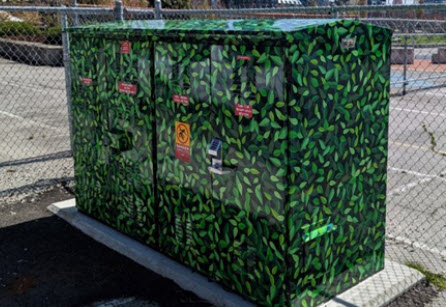Lights, Camera, Action to Clean Energy
Green energy takes center stage at Valid Manufacturing Ltd. where significant strides have been made in developing environmentally friendly solutions. The latest developments have been in the film industry alongside the City of Vancouver, supporting the clean-energy kiosks project. Valid is the primary manufacturer and supplier of the kiosks that the City of Vancouver is currently installing in popular film production locations. These kiosks offer clean-energy for film productions without the use of a generator, in convenient and easily accessible locations. Vancouver’s film industry is further reducing its environmental impact through initiatives like zero-waste programs, the establishment of a carbon-neutral film studio, and the adoption of renewable power sources.
Vancouver Film Industry
Vancouver is a major player in the film industry and is continually growing its presence. On average, 65 movies and 55 TV shows are filmed in Metro Vancouver every year, making Vancouver the third-largest film and TV production center in North America. The film industry in BC has experienced steady expansion, averaging an increase of 13.9 percent over the past ten years. This extensive growth provides a great opportunity to explore improvements and discover ways to enhance the power systems in the process of filmmaking.
Northeast False Creek is a sought-after Vancouver location for parking film-related vehicles such as trailers, food trucks, and other film equipment during film production. In the False Creek area alone, 200 diesel generators are operated annually. The goal of reducing the number of diesel generators used during film production has led to Vancouver’s installation of clean-energy kiosks. The kiosks can be found in the Northeast False Creek area and surrounding the Vancouver Art Gallery, both popular film production locations. Future kiosks are planned for Shaughnessy Park and East Boulevard. Production companies can also put in requests for prospective clean-energy kiosks, ensuring that installations are planned in the most needed locations throughout the city.
Vancouver Film Studios is the first film production facility in the world to become a certified B corporation. Certified B corporations are required to consider the impact of their decisions on several areas, including the community and the environment. Certified B corporations have a focus on using business as a force for good. Vancouver Film Studios is making a sizable environmental impact in the film industry. Among their admirable initiatives are on-site waste reduction and recycling, electric vehicle charging stations, and they have been carbon neutral since 2008. The movie industry is shifting gears to be greener in both production and onscreen. Producers are prioritizing green options in selecting locations and methods for film productions.
Power of the Kiosk

The City of Vancouver’s clean-energy kiosks draw energy directly from the city’s power grid and replaces the use of a gas or diesel operated generator. The first kiosk in Northeast False Creek has a three-phased 400-amp capacity for a total of 1,200-amps, which is the equivalent of a conventional full-sized diesel generator. This single kiosk has the capacity to generate power to support 15 mobile trailers. The installation of the Northeast False Creek kiosk along with planned future kiosks is anticipated to reduce emissions by 33 percent over the next seven years, making a significant stride toward a more environmentally friendly film industry.
The Impact of T3 Diesel Generators
Tier 3 diesel generators pose significant impacts for both the environment as well as our health. These generators emit pollutants into the air, impacting air quality, and posing risk to the health and well-being of ourselves and our environment. The burning of fossil fuels is a major contributor to air pollution, and the use of diesel generators further contributes to Canada’s air pollution challenges.
There have been improvements in generator options with the introduction of the Tier 4 generator. The Tier 4 generator has been designed to be more environmentally friendly with the use of filters and other barriers to reduce emissions released during operation. While this advancement is positive progress, the continued use of diesel-powered generators is still contributing to both air and noise pollution.
A Renewable Future
The City of Vancouver has made a renewable city strategy which imagines a city powered only by renewable energy. Vancouver has ambitiously set out towards achieving 100 percent renewable energy sources by 2050. The renewable energy strategy primarily targets reducing building and transportation emissions within the city. Currently, 31 percent of Vancouver’s energy is derived from renewable sources. The implementation of the clean-energy kiosks is just one of the ways that Vancouver is advancing towards its 2050 goal of a cleaner and more sustainable future.
The Green Spark Group is on a similar mission, working to integrate sustainability into the entertainment industry. As production companies learn about environmentally-friendly production options, their awareness grows. The Green Spark Group is working to streamline the process for film and TV productions to access green alternatives, by providing the information and guidance they need to make their sustainability goals a reality.
A Valid Way to Clean Energy
Valid has supported the film industry for over 10 years by providing a variety of solutions from power distribution to zero-emission battery packs. Following Valid’s acquisition of West Coast Electric (WCE), they have began working with the City of Vancouver to design these film kiosks exactly as required for film professionals to power their sets.
Locate Clean Energy Sources
Creative BC has developed a Grid Power Access Map which shows all the available power tie-in sources in the Lower Mainland. Film production crews can consult the map to identify clean energy options near their film locations. In addition, the map also outlines approved locations for future clean energy resources. The film industry plays an essential role in the location of future kiosks. Production companies input information on their generator usage locations, which provides crucial information for the city when planning future kiosk locations.
The Grid Power Access Map is very important for the film industry when planning for green productions. The map is a valuable resource for locating clean-energy options across the city, which is essential for making informed decisions about film and TV production locations.
City Incentives
The City of Vancouver implemented their Clean Energy Incentive program in 2020. Film productions that have replaced at least one diesel generator with a more environmentally friendly option can reduce their daily permit fee by a whopping 50 percent. Metro Vancouver has a similar incentive program, offering up to a $1,000 discount over two days’ production with the reduction of one diesel generator.
BC Hydro also offers an incentive for the installation of power kiosks in BC filming locations, to offset the use of diesel generators. The incentive provides up to 50 percent of the electrical infrastructure costs for the installation of permanent power kiosks for the film industry.
These cost reductions alone are incentive for production companies to adopt environmentally-friendly options. Along with the cost savings, production companies can feel good about reducing their overall carbon footprint, eliminating noise pollution, and improving air quality for neighboring communities.
Conclusion
With innovations in eco-friendly generators and production of clean-energy kiosks, Valid is contributing towards a quieter and cleaner environment. This commitment to clean energy aligns with the City of Vancouver’s goals and initiatives to reduce emissions in the film industry and to build a greener community.

